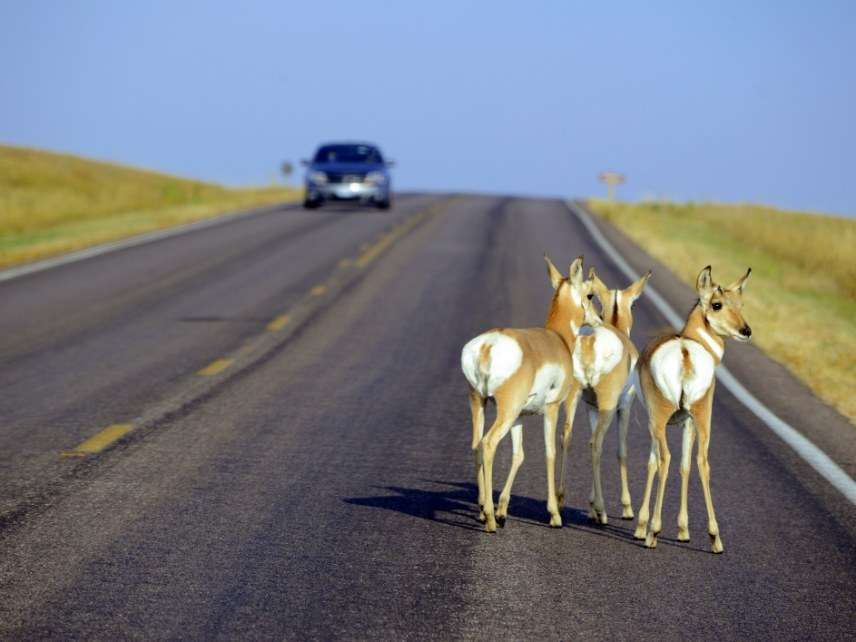Harvesting Roadkill Now Legal in at Least Half of U.S. States
Oregon is the latest. Let's welcome this tasty trend.

If ever your stomach has growled as you've driven past a dead deer or squirrel on a roadside, I have good news for you. More and more states are changing their laws to allow people to make roadkill dinner.
Why allow people to harvest roadkill? There are many benefits.
"Millions of animals are killed on America's roads every week," I wrote last year. "Dead animals—particularly large ones like bear or moose—can also cause human deaths and property damage when drivers hit carcasses in the roadway. Many people don't have access to cheap, sustainable protein. Harvesting roadkill helps address each of these problems."
Others agree.
"These laws do more than permit the use of meat; they aim to solve problems of both waste and hunger," wrote Suzanne Zupello in a recent Eater piece.
"This rabbit was wild, grass-fed, and presumably antibiotic- and artificial hormone-free," wrote Catherine Price, in a 2011 piece for Slate detailing her roadkill adventure in a state, California, where such harvesting is illegal. "Except for the car that had hit it, no food miles had been accrued delivering it to us. So why not bring it home for dinner?"
The fact animals that die in vehicular accidents lived freely until their demise can also make them attractive to those who eschew meat because they don't like the thought of eating animals that are raised in confinement. In fact, even the animal-rights group PETA urges people who want to eat meat to choose roadkill.
Laws allowing people to harvest roadkill are no doubt on the uptick. Oregon lawmakers voted unanimously last month in favor of a roadkill law, but the state gave regulators until 2019 to come up with specifics. (Until the rules take effect, harvesting roadkill in Oregon is still illegal.)
Several states, including Montana, Wisconsin, and Michigan, have relaxed their roadkill laws in recent years, with good results.
A new Washington State law, which debuted in July 2016, appears to be a great success. Like Montana and some other states, Washington requires anyone wishing to harvest roadkill to obtain a permit. The state also requires harvesters to document the date and location of their harvest. The state plans to use data from those records—more than 1,600 in the law's first year—to help "target trouble spots and improve highway safety."
Many sources put the number of states where it's legal to harvest roadkill at 20 or more. According to a detailed and well-researched (though not exhaustive) blog post from Stone Axe Herbals, harvesting roadkill was legal (as of June 2016) to some degree in at least 24 states. With the addition of Washington State and Oregon (pending, in the case of the latter, creation of the aforementioned state rules) since that blog post, it's now legal in at least half of U.S. states to harvest roadkill.
That's great news, but it also means mamy states' roadkill laws are still mired in the horse-and-buggy days, including those in California, Alaska, Texas, and Nevada. In the case of Nevada, as I note in my recent book, Biting the Hands that Feed Us: How Fewer, Smarter Laws Would Make Our Food System More Sustainable, the state "has threatened to lob poaching charges at anyone foraging for roadkill."
While roadkill isn't legal in every state, neither is the steady spread of laws allowing it to be harvested likely to be the precursor of the next culinary trend. For example, roadkill won't be showing up on restaurant menus anytime soon. It's still illegal to sell wild-harvested game meats, not to mention ones that were harvested after being run over by a bus.
What's more, some federal laws still get in the way of harvesting roadkill, even in states where it's otherwise legal. For example, while Washington State allows those who obtain a free permit to harvest roadkill under the new law, a federal ban—which trumps state law—prohibits handling living or dead Columbian white tails, an endangered native species of deer.
When it comes to roadkill, the tide has clearly turned. In a column last year, I noted "laws…that restrict access to roadkill are increasingly viewed as antiquated and wrongheaded." I urged more states to encourage the expedient harvesting of roadkill. Many have, and the results speak for themselves.
An excellent recent Seattle Times look at the first year of the state's roadkill law by reporter Evan Bush notes there may be more than 17,000 vehicle-animal accidents each year in Washington State. With 1,600 or so roadkill-harvesting permits issued in the state last year, the law is barely putting a proverbial dent in the problem. But the law is a great start, and one I hope continues to spread to other states.


Show Comments (51)